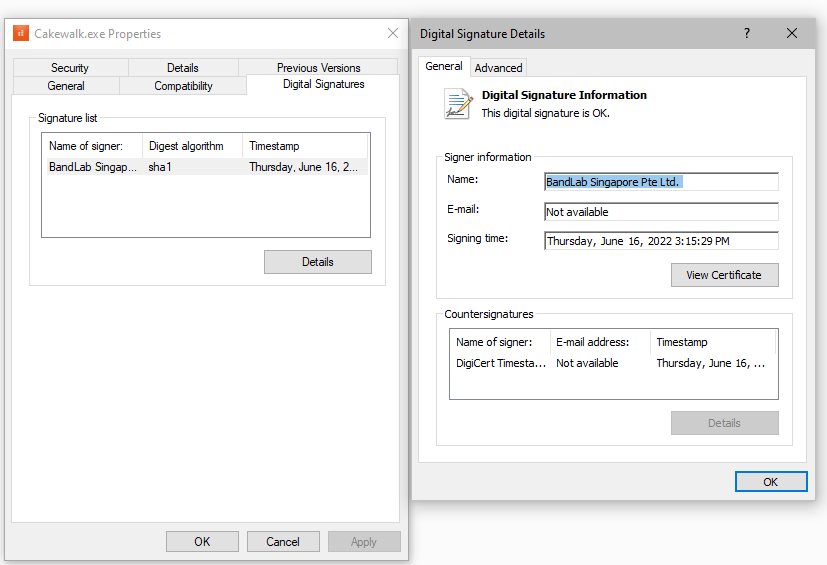-
Posts
5,795 -
Joined
-
Last visited
-
Days Won
107
Everything posted by Noel Borthwick
-
Thanks for your support, guys. It is great that we are able to offer Cakewalk free to our users. As long as we are able to do so, enjoy it....
- 13 replies
-
- 15
-

-

-
We can consider reducing the minimum loop size below 8th notes. A single tick resolution is too low. A DAW needs to do a lot more setup for looping than an audio editor or sampler so looping tiny region on the timeline is not as simple as it might look. Please move threads like this out of the release thread because its more suited to the feature request section.
-
Um you can do as much surgical editing as you need. Looping is not intended to be an editing tool. Use normal snap and zoom with the sample ruler to do surgical edits. Please move this to a different thread since its not related to this release.
-
There is nothing to fix because it isnt a bug. It is intentional that the loop length cannot be made smaller because there are problems rendering tiny loops. In any case there is no musical value in setting loops that small.
-

Change driver to WDM/KS and Cakewalk won't launch
Noel Borthwick replied to DaveMichel's topic in Cakewalk by BandLab
Hi Dave, With all due respect, I don't think it's a Cakewalk bug if your audio driver hangs the app However, your point is taken - within limits there are things that can be done to mitigate bad audio driver behavior. I'm not sure if it would help in your case however. In WDM mode we're at the mercy of how Windows drivers interact with the app if the driver deadlocks there isn't much the app can do. However perhaps we can remember an improper shutdown and reset the driver mode on next launch. Also did you already try launching in safe mode? -

Cakewalk Arm64 Windows 11 on Mac M1
Noel Borthwick replied to Dylan O'Brien's topic in Cakewalk by BandLab
@Skoo How are you installing the instruments? -

Errors updating Cakewalk with older Win 7 version
Noel Borthwick replied to Sven's topic in Cakewalk by BandLab
See this thread for the connection error issue. -

Errors updating Cakewalk with older Win 7 version
Noel Borthwick replied to Sven's topic in Cakewalk by BandLab
As Scook said the web installer does similar checks to the in-app install process. All CbB versions from more than 6 months ago update seamlessly from within the app itself without needing to run the web installer manually. -
Yes at some point we'll update to mix recall. Lots of stuff on our plate currently...
-
Cakewalk was the first DAW to add this in 2016. Cubase added it somewhat later but its not quite as powerful as our implementation.
-

Errors updating Cakewalk with older Win 7 version
Noel Borthwick replied to Sven's topic in Cakewalk by BandLab
Please stop using BandLab Assistant. For several months it's no longer been the mechanism to update Cakewalk. Use this link to get the standalone installer. Once you have a recent version there is no need for an installer since updates can be done inside the app itself by using Help | check for updates. -

Cakewalk Activation Error (20)
Noel Borthwick replied to Wong Jian Ming's topic in Cakewalk by BandLab
Anyone who was having this problem please install the latest 2022.06 Update 1 EA that we released. Even though the error 20 is caused by something completely external to Cakewalk, I've added some defensive code to the application that should prevent it from deactivating the application. (Something was causing the windows API's that read certificates to stop working. and this is what lead to the issue.) Please check it and report back ASAP if it solves the issue. Attn: @Wong Jian Ming @Mark MoreThan-Shaw @Illogistical Resource Dept. @mesabassman @Lombardi -

vc_runtimeminimum_x64.msi missing during CW update
Noel Borthwick replied to jm52's topic in Cakewalk by BandLab
Did you install the redist installer linked above? -
Clicking solo in the mix module is a global operation to solo or unsolo ALL tracks. For soloing individual tracks or buses you have to click on the individual strip solo buttons.
-

Cakewalk Arm64 Windows 11 on Mac M1
Noel Borthwick replied to Dylan O'Brien's topic in Cakewalk by BandLab
@Skoo we updated the main app installer a couple of weeks ago. If you download the latest it should install fine on Windows 11 for ARM64. Download the Cakewalk Installer from here -
The biggest use of mix recall is to avoid the need to save different version of a project just to compare mixes. Its much quicker to switch mix recall presets than load the entire project file. Mix recall also will save and restore plugin settings and all your automation envelopes, something that digital mixing consoles cannot do.
-

Cakewalk Activation Error (20)
Noel Borthwick replied to Wong Jian Ming's topic in Cakewalk by BandLab
@Wong Jian Ming and @Mark MoreThan-Shaw I've PM'ed you a link to a build that has some extra diagnostics. Please install it and PM me your results. If the error still occurs the extra information should shed some light on why its failing with the cakewalk exe. Thanks! -
Mix recall affects MIX settings, automation and fx, as documented here. Think of it as recalling mixer snapshots for your project including effects and automation data. It works by applying those settings to the current track data your project, which is the actual tracks and clips. If you remove tracks or clips, mix recall will not bring the deleted tracks and clips back. Also any saved mix recall settings that reference tracks or buses that do not exist in the project will be ignored. Why do you need to delete tracks from the project? Just mute them and use mix recall to save a snapshot of the mute state.
-

Cakewalk Activation Error (20)
Noel Borthwick replied to Wong Jian Ming's topic in Cakewalk by BandLab
Strange. It would be good to find out which redist was damaged. Can you see if this installer helps? -

Save mix Read/Write parameters for later use?
Noel Borthwick replied to Sven's topic in Cakewalk by BandLab
Yes mix recall is the solution that handles this. It will actually save all the envelopes and plugin / track settings that can be restored from a snapshot. -

Cakewalk Activation Error (20)
Noel Borthwick replied to Wong Jian Ming's topic in Cakewalk by BandLab
Ok that indicates that it's not related to the release and is environmental. Nothing has changed with the activation process in over a year. Which version of windows are you running? It's possible that some windows update impacted this, or for that matter one of the Microsoft, redistributables. -

Cakewalk Activation Error (20)
Noel Borthwick replied to Wong Jian Ming's topic in Cakewalk by BandLab
Bizarre And only on this release? If you roll back it’s ok? Also what version of windows? -

Cakewalk Activation Error (20)
Noel Borthwick replied to Wong Jian Ming's topic in Cakewalk by BandLab
That would imply that the issue isn’t related to the program but something environmental. Do you have an antivirus that may have blacklisted the program or something like that? If you rename it back or copy the exe file does the problem return? -

Cakewalk Activation Error (20)
Noel Borthwick replied to Wong Jian Ming's topic in Cakewalk by BandLab
You shouldn't need to do a full uninstall. The first thing to check is look at the version info for cakewalk.exe. It should look like this: Check if it says "this digital signature is ok" If not can try deleting (or renaming) the cakewalk.exe file and reinstall the application and retry.




